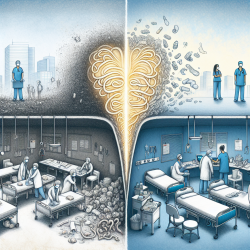The intersection of law and ethics in nursing practice is a critical area of focus, particularly in the context of Medical Assistance in Dying (MAiD). The research article "But it’s legal, isn’t it? Law and ethics in nursing practice related to medical assistance in dying" by Schiller et al. (2019) offers invaluable insights for practitioners. This blog explores how nurses can enhance their practice by implementing the outcomes of this research and encourages further exploration of this vital topic.
Understanding the Legal and Ethical Landscape
In June 2015, the Supreme Court of Canada struck down the Criminal Code's prohibition on assisted death. Subsequently, the federal government enacted legislation that allows for MAiD, with Canada becoming the first country to permit nurse practitioners to act as assessors and providers. This landmark change, driven by advocacy from the Canadian Nurses Association, underscores the importance of understanding both legal and ethical dimensions in nursing practice.
Key Takeaways from the Research
The research by Schiller et al. (2019) highlights several critical points for nursing practitioners:
- Legal vs. Moral/ Ethical Considerations: The study emphasizes the importance of distinguishing between what is legal and what is ethical. While the law provides a framework, ethical considerations often require a deeper, more nuanced approach.
- Autonomy and Choice: Modern liberal constitutionalism places significant value on autonomy and choice. However, this can sometimes overshadow the ethical considerations that nurses must navigate.
- Creating Morally Sustainable Workspaces: The research advocates for work environments that balance patient choices with the moral well-being of nurses. This is crucial for maintaining ethical integrity in practice.
Implementing Research Outcomes in Practice
To improve their practice, nursing professionals can take several steps based on the research findings:
1. Continuous Education and Training
Staying informed about the latest legal and ethical guidelines is essential. Engage in continuous professional development through workshops, seminars, and courses focused on MAiD.
2. Reflective Practice
Regularly engage in reflective practice to consider how personal values and beliefs influence professional actions. Reflective practice helps in understanding and reconciling the legal and ethical aspects of MAiD.
3. Ethical Decision-Making Frameworks
Utilize ethical decision-making frameworks to guide practice. These frameworks can help navigate complex situations by providing structured approaches to ethical dilemmas.
4. Collaborative Practice
Work collaboratively with colleagues, ethics committees, and legal advisors to ensure that decisions are well-informed and ethically sound. Collaboration fosters a supportive environment for addressing ethical challenges.
Encouraging Further Research
While the research by Schiller et al. provides a solid foundation, ongoing research is vital for adapting to evolving legal and ethical landscapes. Nurses are encouraged to:
- Participate in Research: Engage in or support research initiatives related to MAiD to contribute to the body of knowledge and improve practice standards.
- Stay Updated: Regularly review current literature and guidelines to stay informed about new developments and best practices.
- Advocate for Policy Changes: Advocate for policies that support ethical nursing practice and address the challenges identified in the research.
Conclusion
Navigating the legal and ethical complexities of MAiD requires a commitment to continuous learning and ethical integrity. By implementing the research outcomes from Schiller et al., nursing practitioners can enhance their practice and contribute to creating morally sustainable workspaces. To read the original research paper, please follow this link:
But it’s legal, isn’t it? Law and ethics in nursing practice related to medical assistance in dying.










